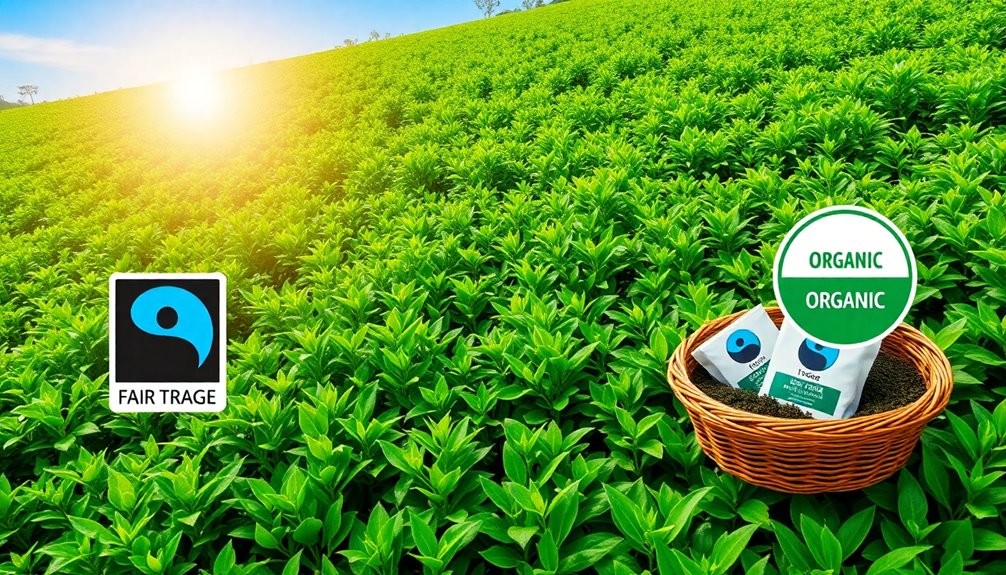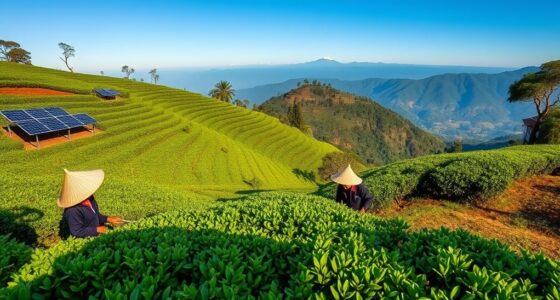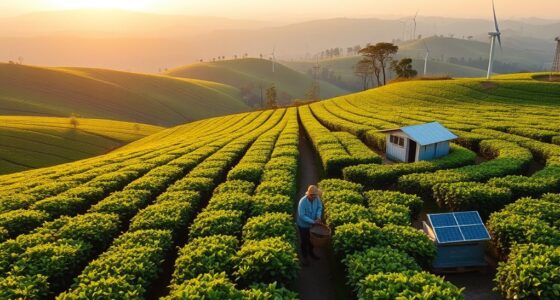When it comes to tea, Certified Organic and Fair Trade each have special meanings! Certified Organic means the tea is grown without harmful chemicals, making it great for the planet. Fair Trade, on the other hand, ensures farmers are paid fairly and work in safe conditions. While Organic focuses on protecting the environment, Fair Trade champions fair wages and community support. Sometimes, you can find tea that's both Certified Organic and Fair Trade! So, you can enjoy your tea knowing it helps both the earth and the people who grow it. If you're curious, there's more to discover about these labels!
Key Takeaways
- Certified Organic tea is grown without synthetic chemicals, promoting environmental health and biodiversity in tea-growing regions.
- Fair Trade certification ensures fair wages and safe working conditions for farmers, supporting their communities' socio-economic development.
- Many teas can be organic but not Fair Trade, leading to consumer confusion about labor practices and environmental standards.
- Fair Trade Organic teas combine both environmental sustainability and social equity, providing benefits for both farmers and the planet.
- Understanding these certifications helps consumers make informed choices, aligning their purchases with personal values regarding sustainability and ethical sourcing.
Introduction
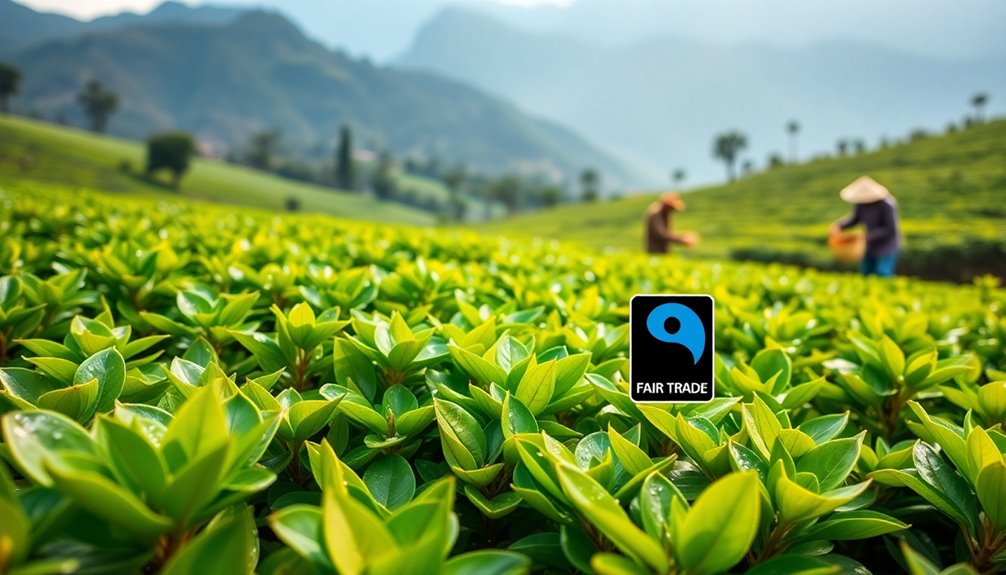
Navigating the world of tea can be overwhelming, especially when it comes to understanding the labels on your favorite blends. Two important terms you might see are Certified Organic and Fair Trade. Each label tells a unique story about how your tea is made and where it comes from.
Certified Organic tea is grown without synthetic fertilizers, pesticides, or herbicides. This helps protect our environment and promotes biodiversity.
On the other hand, Fair Trade tea focuses on ensuring tea producers receive fair wages and safe working conditions. It's all about creating a sustainable and ethical supply chain.
When you choose Fair Trade tea, you often support the Fairtrade Minimum Price, which helps communities by funding healthcare and education projects.
However, organic tea doesn't have a similar structure for community support. Instead, it guarantees that the tea is produced using environmentally friendly methods.
Understanding these differences can help you make informed choices. By knowing what Certified Organic and Fair Trade mean, you can pick teas that match your values, whether you care more about the environment, fair compensation, or both.
Enjoy your tea journey!
Tea Certification Criteria Differences
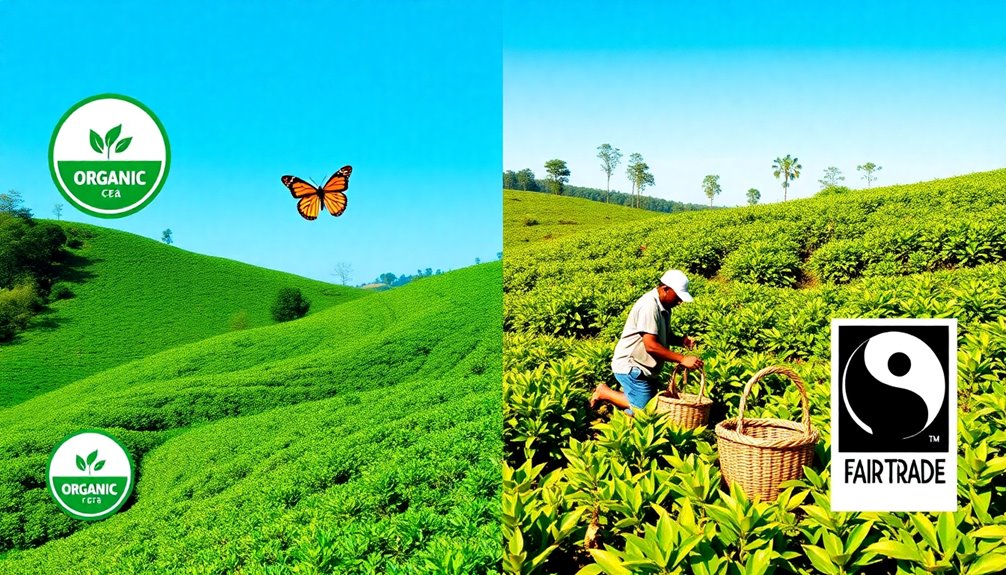
When choosing between Certified Organic and Fair Trade tea, understanding the specific criteria behind each certification can simplify your decision.
Organic tea is grown without synthetic fertilizers, pesticides, or herbicides, which helps protect the environment and encourages biodiversity. The USDA defines organic as needing chemical-free soil, making it a truly organic choice for you.
On the other hand, Fair Trade certified tea focuses on the well-being of the producers. It ensures that farmers receive fair wages, safe working conditions, and sustainable livelihoods. Fairtrade certification emphasizes social and environmental factors but doesn't require organic farming methods.
While organic tea undergoes annual audits to maintain its standards, Fair Trade certification involves criteria like fair labor practices. It also includes a fixed premium paid to growers, ranging from $0.50 to $1.50 per kilogram, ensuring they earn a better price for their hard work.
In short, if you're passionate about sustainable farming practices, go for organic tea. If you care about supporting producers and their communities, choose Fair Trade certified tea.
Both certifications contribute positively to the tea industry, just in different ways!
Certification Impacts Pricing Strategies
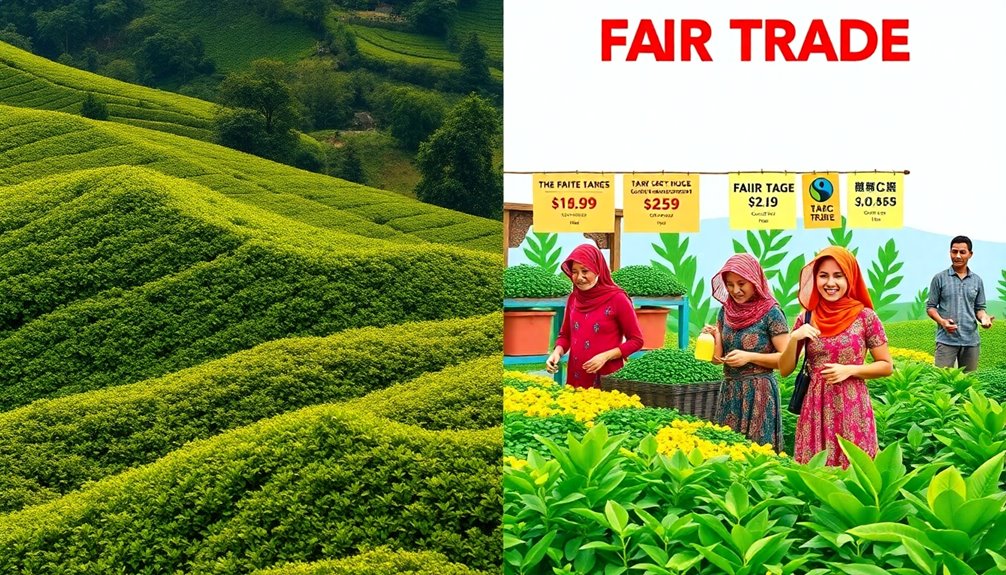
The pricing strategies for Certified Organic and Fair Trade tea reflect the unique costs and benefits associated with each certification.
When you choose Fair Trade teas, you're often supporting farmers with a guaranteed minimum price. This means they can earn a steady income, no matter how the market price fluctuates. Plus, they receive a fixed premium that can boost their earnings!
On the other hand, Organic Certification leads to higher prices, too. This happens because consumers want chemical-free products. Tea companies invest in sustainable tea production methods, which can increase costs.
The good news is that Fair Trade Organic teas combine both certifications, offering even more benefits to farmers and the environment.
It's exciting to see how these certifications can impact what you pay. For instance, the Fair Trade Minimum Price for organic products is $2.20 per pound, compared to $1.80 for non-organic. This financial incentive encourages more farmers to adopt organic practices.
Cultural Significance of Tea Certification
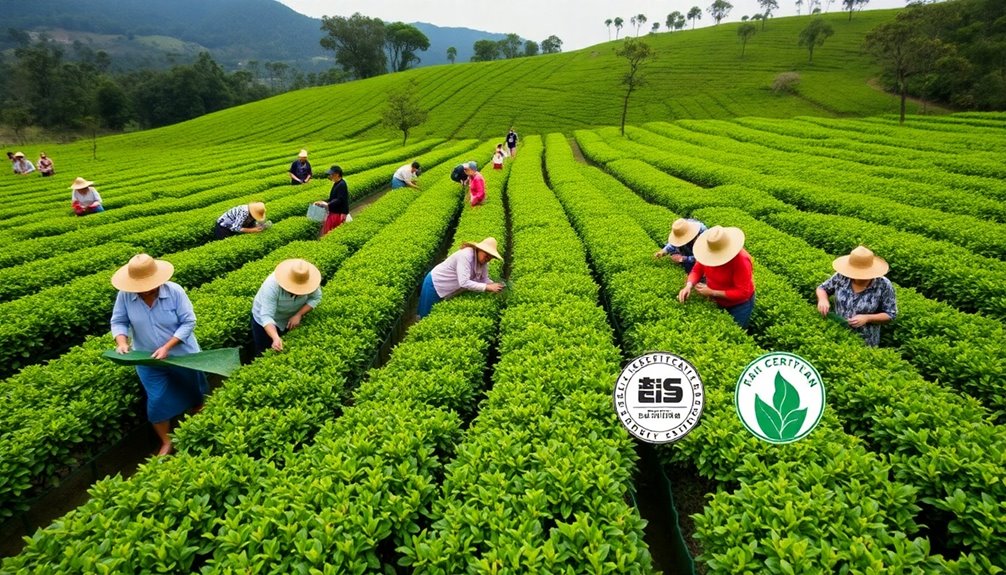
How do tea certifications intertwine with cultural heritage? They play a huge role in preserving the traditions of tea growing communities. Fairtrade certification ensures that producers would receive fair wages, which helps them support their families and communities. This is super important in places like Sri Lanka and India, where tea isn't just a drink; it's part of their identity!
Organic certification, on the other hand, emphasizes the need to protect the environment. It supports traditional farming methods, allowing farmers to grow tea without harmful chemicals. This respect for nature is part of their cultural practices.
When you choose certified tea, you're not just making a purchase; you're connecting with the rich stories and values behind that tea. People love to know where their tea comes from. They want to support farmers who care about their communities and the planet.
Consumer Misunderstanding of Labels
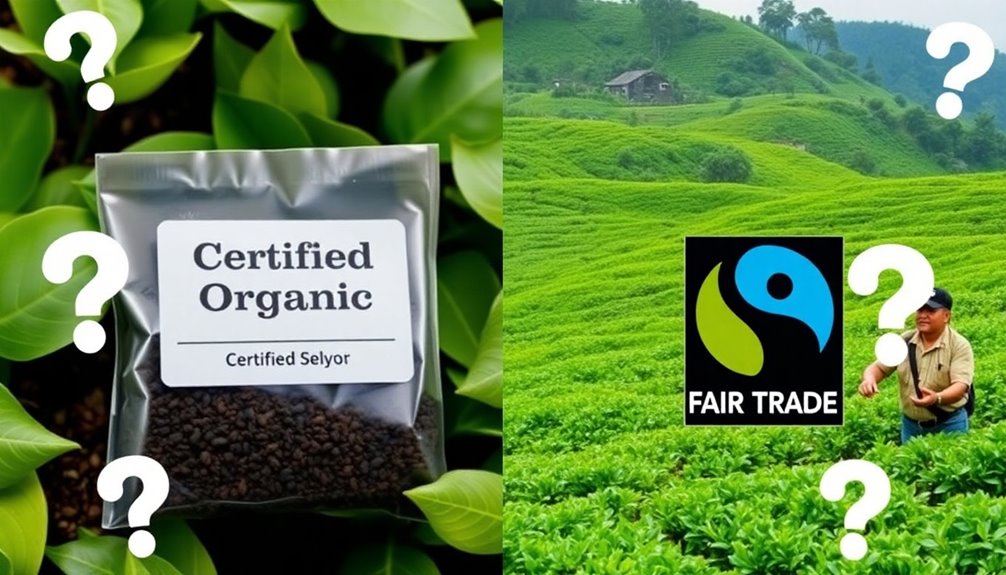
Understanding the significance of tea certifications is key, especially when it comes to consumer confusion regarding labels. You might think that if a tea is labeled as organic, it guarantees fair wages and safe working conditions for farmers. But that's not the case! Organic certification mainly means the tea is grown without synthetic pesticides and fertilizers.
On the other hand, Fair Trade focuses on ethical sourcing, ensuring farmers receive fair prices and support for their communities. Many shoppers assume all organic teas are Fair Trade certified, but that's not true! Only a portion of organic tea products carry that Fair Trade label. This can lead to a lot of consumer misunderstanding.
Plus, did you know a significant amount of tea sold globally isn't organic or Fair Trade? This can mislead you into thinking all tea is produced ethically. The lack of uniformity in these labels adds to the confusion. Terms like "natural" or "sustainable" often pop up without strict standards, making it tricky to know what you're really getting.
Practical Applications
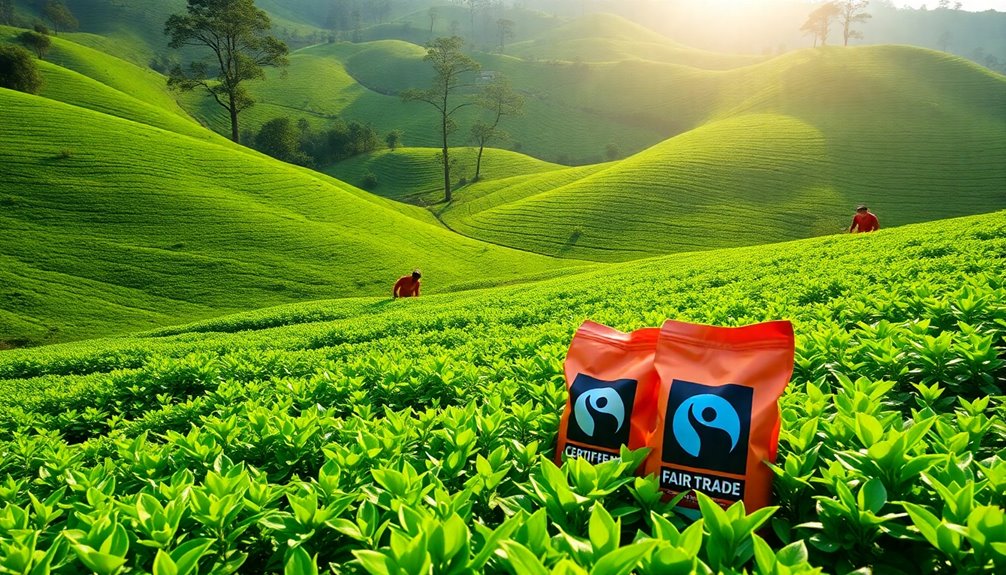
Navigating the world of tea certifications can seem overwhelming, but knowing how to apply this knowledge in your purchasing decisions makes a big difference.
When you choose Certified Organic tea, you're picking tea grown without synthetic fertilizers or pesticides. This supports biodiversity and healthier ecosystems!
On the other hand, Fair Trade tea focuses on treating farmers fairly, ensuring they earn a Fair Minimum Trade Price. This helps protect them from market changes and allows them to invest in community projects like schools and healthcare.
If you want both ethical production and environmental sustainability, look for teas that are both Fair Trade and Certified Organic.
These teas often incorporate organic practices while providing fair wages and safe working conditions for workers.
For example, many of Fraser Tea's offerings combine these certifications, showing how tea can be good for you and the planet.
Frequently Asked Questions
Does It Matter if Tea Is Organic or Not?
Whether tea's organic or not can matter to you depending on your values. You might prefer organic for its environmental benefits, or lean towards conventional for cost and availability. Your choice reflects your priorities.
What Is the Difference Between Fairtrade and Organic?
Fairtrade focuses on fair compensation for farmers and safe working conditions, while organic emphasizes the absence of synthetic chemicals. They serve different purposes, ensuring ethical labor practices and promoting environmentally friendly farming, respectively.
What Does Fairtrade Tea Mean?
Fairtrade tea means you're supporting producers who receive fair compensation and benefits from their work. It ensures social programs, safe working conditions, and community development, empowering farmers to achieve sustainable livelihoods and economic stability.
Does Fair Trade Certified Mean Organic?
Fair Trade certified doesn't mean it's organic. While Fair Trade focuses on fair wages and safe conditions for farmers, organic certification ensures no synthetic chemicals are used. Always check for both certifications to support ethical practices.
Conclusion
Now that you know the differences between certified organic and fair trade tea, you can make informed choices! Each certification has its own special meaning, helping farmers and the environment in different ways. When you enjoy your next cup of tea, think about what those labels really stand for. By choosing wisely, you're not just sipping a delicious drink, but also supporting a brighter future for tea farmers and our planet. Cheers to that!

